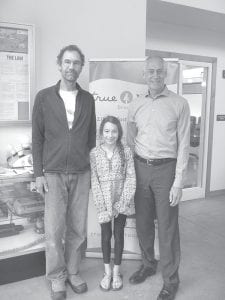Olya Wright, 11, is the leader of the Nordic Nature Group, a collection of naturalists who are working hard to make our small world, and by extension, the great big world, a better place to live. In February, they delivered a climate action report card to the city of Grand Marais with some bad news: we had received a D+. The naturalists followed up with a plan that includes these three, clear-eyed goals:
1. Create a climate action plan that would reduce our greenhouse gas emissions to levels that would protect our children and grandchildren in the community from the effects of climate destruction.
2. Begin creating this climate action plan within three months and complete it as soon as possible.
3. Find a way to include the youth voice in decision making for things that have to do with climate change and the environment.
The Council unanimously moved to pass a Climate Inheritance Resolution that represents a commitment to creating a climate action plan in the next year and working to improve the city’s current grade. As Olya says, it’s “not just a grade, it’s a solution.”
Recently, Olya and George Wilkes, the co-director of our local Citizen’s Climate Lobby (CCL), and CCLEP director gave a joint presentation to the Cook County Board, asking for their “assistance in coming up with climate change solutions.” The request comes on the heels of the Grand Marais Climate resolution as well as PUC’s passing a resolution in support of the CCL Carbon Fee and Dividend proposal. The commissioners’ questions included, “What is the cost of not doing it?” and, “If we support this, what does it do?” Wilkes replied, “We want our congressional delegation to pursue this,” by demonstrating that “the action has support at the grass-roots level.” Commissioner Deschampe acknowledged that while “climate change is one thing. . .” he added that he “can’t support something that adds a fee,” and used the example of purchasing a new front-end loader and having the manufacturer add “$100,000 to the cost” in response to higher fees on vehicles that use fossil fuel.
His point is a good one, because the nature of the current energy market is prohibitive to people who can’t afford to buy a dual-fuel vehicle, pay higher prices for fuel, and probably can’t afford to install solar panels on their homes without a financial incentive to do so. It is very important to distinguish, however, that this Carbon Fee and Dividend proposal is different from other plans because it taxes carbon at the source while returning the money collected to every household, based on income. The idea is that the energy market and the stakeholders in that marketplace will be forced to transition to clean fuel sources, over time, in response to progressive fees placed on high-carbon emitters. While the market is in transition, families will receive dividends in proportion to their own carbon output, which in most cases is exponentially lower than say, the Koch Brothers Industries or Exxon Mobil.
But can this really happen? I’m happy to report that Carbon Fee and Dividend has already been successfully applied in British Columbia since 2008, where the dividend part of the equation has resulted in a 12.9 percent decrease in British Columbia’s per capita emissions in 2008-2013 compared to 2000- 2007, and was three-and-a-half times better than the 3.7 percent per capita decline for the rest of Canada. (www.carbontax.org)
Here in Cook County, it is unclear if the county board will pass a formal resolution, but they did agree to further discussion before putting it to a vote sometime in August. Tailoring her comments directly to Olya, Commissioner Storlie said, “With your fresh eyes, you are really helping to open my eyes to what is happening now.”
Olya has also taken her message to the board of Arrowhead Electric, where her presentation, “Tackling Global Climate Change at the Local Level,” outlined the steps that we all will need to take if we are serious about solving the problem of climate change. The first step, is the willingness to open our eyes and ears to the young people in our community, and to welcome their voices and ideas about how to create our local energy future. They are, after all, the biggest stakeholders in the room, and they are telling us, with some urgency, that we are out of time.
Staci Drouillard,
Project Coordinator,
Cook County Local Energy Project
Grand Marais



Loading Comments